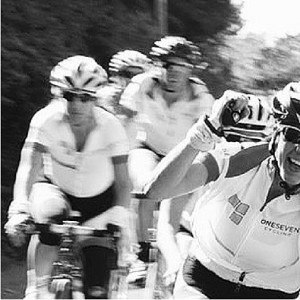Acknowledging Accomplishment

My learning adventure beget by a solo cycling excursion was winding down. I had planned and prepared well for my ride barring the weather faux pas. Getting caught in the downpour had given me the opportunity to practice awareness and centering at a new level and to reframe an unplanned situation into one of learning. And I still had insights to gain before making it back home.
The skies became blue again about halfway home and by the time I was on the final stretch I could see that not a single drop of rain had fallen near my house. The streets were completely dry, and there I was, my back covered in mud from the spray off my rear tire. I felt exhilarated and proud for sticking it out. I was also aware that I was alone in my experience – no one else was wet and muddy and feeling all happy, as far as I could tell. I sensed a desire to be recognized for my small feat and then felt silly for it.
My thoughts and my legs were keeping pace with each other and I was struck by the realization that every day there are multiple chances to recognize someone for their hard work and accomplishments. How many opportunities do I miss to acknowledge others for what they are proud of, for what they have struggled to complete or for important milestones they have reached? How many cyclists have I encountered who are feeling proud of their maiden cycling voyage or who are getting back on the saddle after an illness or injury?
A common request I receive from leaders is to learn to give constructive feedback more effectively. It’s an activity that hardly anyone enjoys but that is necessary. Rarely do I get a request to help a leader shore up his or her ability to give positive feedback and this capability is every bit as important. Take a moment to reflect on the last time you received sincere acknowledgement for a job well done. How did it impact you? You may have noted a sense of pride or satisfaction, of feeling valued and encouraged to continue and maybe even to increase your efforts. There is no shortage of business literature these days extolling the effect of praise and positive work environments on organizational outcomes.
Positive feedback is an essential practice to engage in, given the impact it can have on individuals. When teaching feedback methods I always begin with the practice of giving positive feedback. Two decades have passed since Stephen R. Covey introduced the concept of an ‘emotional bank account’ and suggested that we make more deposits than withdrawals to maintain healthy relationships both in our personal and professional lives. Acknowledgement falls in the category of an emotional bank account deposit. In order to keep a positive balance, I ask leaders to practice giving positive feedback for a few weeks before giving the constructive type (typically experienced as a ‘withdrawal’). At first many find naming others’ virtues uncomfortable and even unnecessary.
Why is that?
One common argument for giving praise is, “Why should I acknowledge someone for doing his or her job?” Why not? With Gallup reporting that 70% of the U.S. workforce is actively disengaged, a little acknowledgement could go a long way and it doesn’t cost a dime. But it might cost you some humility. Most of us enjoy hearing when our performance is hitting the mark, and specifically how our contribution is adding value to the organization.
When someone does something good, applaud! You will make two people happy. – Samuel Goldwyn
When acknowledgement, or positive feedback is given meaningfully, a feeling of connection and even vulnerability can result. This sense of connection can be uncomfortable for some and we may shy away from it. Heartfelt acknowledgment touches the giver and receiver in a special way and usually leaves both of them feeling uplifted. When a group of leaders in a workshop practice giving sincere positive feedback to each other there is an immediate and noticeable upshift in the mood. Providing direct and positive feedback mutually beneficial!
Correction does much, but encouragement does more – Goethe
Some of us are better at seeing gaps in performance, or ‘opportunities for improvement’. We are all naturally built to look for what’s wrong, to notice signs of danger. This is another survival mechanism we come into the world fully loaded with. Yet continually noticing and calling out what’s not working diminishes morale and throttles relationships. Consider developing an alternate habit of catching people doing something right and then acknowledging it.
If I had received correction on my decision to ride that day or on my cycling form, I would have felt at least a little deflated. Instead, my family and friends gave me virtual ‘high fives’ and I’m encouraged to take it to the next level. While both constructive and positive feedback are useful when given skillfully and sincerely, I recommend an out-of-balance condition on the positive side when desiring to keep people engaged. Zenger|Folkman says that “only positive feedback can motivate people to continue doing what they’re doing well, and do it with more vigor, determination, and creativity”. (HBR, March 2013)
Try This:
- Tune your observation to pay attention to what your team, your friends, your family members are “doing right” – including what they’re attempting, accomplishing and what they may be proud of. The more you look, the more you’ll see.
- Acknowledge the accomplishment in a meaningful way. Rather than giving general praise, try the S-B-I method: Describe the Situation, the observableBehavior and the Impact. Example: LeeAnn, last Saturday when it started raining during your ride, you stuck with it and turned it into an adventure. I hear it was a great learning experience for you and seems like it gave you more confidence for your next challenging ride.
- Schedule time each week dedicated to acknowledgement. Use this time for in-person or written (handwritten or digital) acknowledgements. Some will argue against a digital acknowledgement. I say don’t let the perfect get in the way of the good – and I also wouldn’t make digital a primary mode. In person is by far the most effective (over the phone or video call is ‘in person’ when you can’t be in the same physical space.
